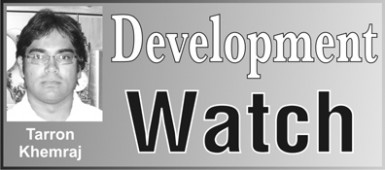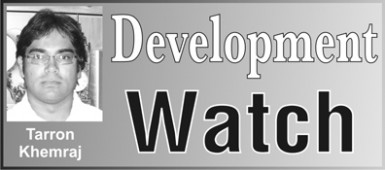This is the season of funny debates. There is talk among observers and politicians that Guyana is either in recession or about to enter into one. Recession is a precisely defined term that requires data to verify. A recession is defined as two successive quarters of negative GDP growth, thereby requiring quarterly GDP data to verify. We would also need to extract the cyclical aspect of the unemployment rate to observe whether it coincides with the negative GDP growth. This requires labour market statistics on a quarterly basis as several other sister CARICOM countries have.
These quarterly macroeconomic statistics are not published in Guyana. The rate of unemployment is a mystery. Unemployment has a cyclical component; therefore, relying on a decennial population census is not the way to measure present trends in unemployment and the labour market as a whole. These surveys have to be done each quarter so policy makers can figure out the short-term swings in employment. This is the only way we can say Guyana is in a recession.

No career politician since independence – including Mr. Jagdeo who is rightly calling for counter-cyclical policies – has had the wisdom to make policy and form debates on the basis of objective data analyses. These days in America data science and machine learning are two of the new big games in town. Young kids armed with PhDs in microeconomics and supreme programming skills, working with their computer science colleagues at Google, can predict our behaviour when we use our smartphones and computers, yet in a little corner of South America the entire 2012 population census has not been released.
There is much talk of youth empowerment, youth this and youth that. But I can think of at least 100 positions requiring data analysis and collection that have to be filled in the government agencies. There is also the private sector that needs data analysts as they do in Trinidad and Barbados. These are jobs for quantitatively inclined youths from University of Guyana. As a young man in my early 20s the most important thing was to get a rewarding job. I am certain youths feel the same today. Data science jobs are highly paid and rewarding for young people who are motivated to go down that road.
However, there is talk in town coming from the elites – drawn mainly from the legal profession – to spend the country’s very scarce financial resources on a local law school when there does not seem to be a shortage of legal practitioners. The crucial need to train data scientists in overlay fields like machine learning, statistics, economics, political science, biology, psychology and sociology has not yet registered on the radar of the decision makers. A choice will have to be made between the law school and boosting the data analytics capabilities at University of Guyana across subjects.
In the absence of direct indicators of a recession, let us look at a few indirect measures. Let us compare several variables from half-year 2014 to half-year 2015 (the last period the data are publicly available). First, it is helpful to look at the trends in commercial bank credit to the private sector. In June 2014 commercial banks loaned G$94.6 bill to businesses, G$29.3 bill to consumers and G$60.9 bill for real estate or mortgage loans. By June 2015 the numbers for the three private sector categories are: G$99.1 bill to businesses, G$30.4 bill to consumers and G$69.3 bill for mortgages. These numbers suggest the economy is slowing down, but not a recession as there is still credit expansion as at half-year 2015.
Second, the net international reserves held by Bank of Guyana declined from US$650.4 mill in June 2014 to US$619 mill in June 2015. The Bank of Guyana released foreign exchange to the market during this period. This effort helped the exchange rate to appreciate between the two periods. The mid-rate fell from G$207.49/1US$ in June 2014 to G$205.48/1US$ in June 2015. The appreciation is even more remarkable given that commercial banks increased their net foreign assets (see previous column). Kudos to the Bank of Guyana!
By December of this year we will have a better picture as the new numbers are released. By then the new government would have to claim ownership of the happenings in the economy. Ironically, the Marxist-Leninist PPP is these days seen as the pro-business party. The new government faces some perception problems. This is probably driven by the failure of President Granger and Prime Minister Nagamootoo to inculcate more diversity – in terms of academic training and career background of the advisors – at Ministry of the Presidency; the desire to contract the money supply by removing government’s deposit from private commercial banks; and nebulous proposals like village economics, which to me reads like maintaining the masses just at subsistence level. It will take an entire column to register my puzzlement relating to the idea of village economies.
By January 2016, the AFC-APNU government will also have to assume ownership of the mess – engineered by the PPP – that is GuySuCo. Therefore, clear policy statements about the sugar industry will have to be presented. I think the specialty hospital project should be reactivated so that it is funded by private investors. In addition, the new government will have to make sure it does not throw out the baby with the bathwater. For example, what percentage of the drugs sourced from New GPC is manufactured or compounded inside Guyana? Can an incentive system be established to make sure more medicines are made at home? Can NICIL operate as an investment bank on behalf of the government? I think so. A comprehensive renewable energy framework would need to be proposed in the six months.
Comments: tkhemraj@ncf.edu





